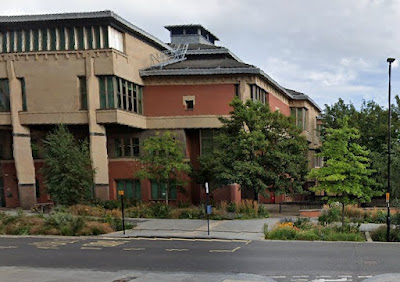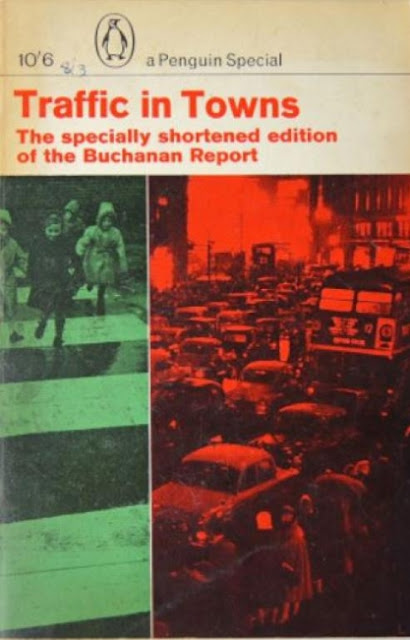STOP PRESS
McGills take over First Scotland EastMore tomorrow!
The Short Cut Described
In 1971, fbb has alighted from his service 60 in Sheffield's High Street and, with just a minute to connect with a service 150 at Bridge Street bus station (at least two minutes away) so has set off via Aldine Court. Time for that map!Of course the above is a modern map, but the route is unchanged although the architecture is different. fbb guesses that well before 1971 he would have been, in theory, uneasy about prowling the courts and closes of central Sheffield. This, for example, would have been the bottom of Aldine Court where fbb's route crosses Hartshead (the yellow route).In a curious twist of fate, Aldine Court has lost its few shops and has simply become an alleyway between tall buildings. The entrance on High Street looks quite meaningful ...
... but once through that arch there is nothing but high walls ...... and creepiness ...... until you come out on Harsthead. Next fbb would cross over into Meetinghouse Lane ...... now much changed.Then straight across Bank Street and into Scargill Croft. It would be nice to think this was named after a certain Arthur of that ilk ...... but historically it was very much a "back passage" of working Sheffield.The Bank Street End is unchanged from fbb's schoolteacher days ...... but the bottom end exits opposite the Law Courts ...... whence a left hand turn would take a slightly breathless teacher to the stop for route 150.For a coupe of weeks this was the route to work and it never failed, although occasionally it was close.
But there was backup. If the 60 was late, missing or delayed, fbb could walk to Fitzalan Square and catch a service 4.It was a longer journey, but an ever-keen fbb-to-be would still be in time for a reviving cuppa before tackling morning registration, assembly and the first three lessons before break - and another reviving cuppa.
Whilst the route via Aldine Court is still available today, so much else has changed that a 2022 fbb would not be able to use it - indeed it would not be necessary because interchange in the city is now much easier.
But the overall journey is slower, likely to be more frustrating and less reliable, as we shall see tomorrow.
Yet Another Tank Wagon ...Not for petrol, nor fuel oil, nor even cement, but aluminium in powder form. These tanks carry the product from the Aluminium Smelter (the last such plant in the UK) near Ben Nevis to customers throughout the UK.
Revolution Trains have made a promo video about this new model. The video is 9 minutes long, but do not shrink from the opportunity to watch, as it is of interest to non-modelllers and modellers alike. Anyway, if it is too long to watch now, you can find it on YouTube and watch at your leisure.But for fbb, an avid tank wagon collector (saddo in other words), there is a snag.Revolution Trains are only selling this fine model in PACKS OF FOUR ...
... at £150 for the set.
Grrr. Seethe. Frustration. Hiss. Boo.
Maybe some kind retailer will commission some singletons? PLEASE!
Clean Green Mean Buses - A P.S.
Correspondent Peter adds a thought to fbb's recent blog, which wondered whether anything is actually achieved by using electric buses of various kinds - except, obviously, cleaner air in our cities..
Maybe the only answer is to make less fuss about a bus and get rid of all (or most) of the smaller vehicles in our towns and cities irrespective of how they are powered.The above is just one snapshot, largely taken out of context. But it does challenge our thought processes.
Traffic in Towns was commissioned in a rather unusual way: it was an officially sponsored report not by a civil servant or politician, but by Colin Buchanan, Professor of Transport at Imperial College, who was encouraged to ‘collect his own team of colleagues’ to form a working group. Its task was to study the longterm development of motor traffic in British urban areas and the effect that it was likely to have. The published report cost 50s (£2.50), a significant sum in the 60s.
To make it available, the government joined with Penguin Books to publish a condensed version which sold for 50p (that was a whole ten Bob, about a month's pocket money for your author), and it is that version that fbb bought.Towards the end of the report author Colin Buchanan proffered some "blue sky" thinking - although nobody used such a trite snippet of management-speak back then.
Mr B suggested, perhaps naughtily, that instead of expensive traffic management schemes, the authorities should nip out overnight and block some "essential routes" with walls of sandbags; put up signs saying "road closed" and see what happens.
Nobody has dared do it.
YET!!
Next How It Is Now blog - Thursday 8th Sept






















No comments:
Post a Comment